Greed
(Again with the greatest of respect, Simon, not giving an explanation here is not helpful (believe me, I take no pleasure whatsoever in saying that). What's wrong with "https" and the padlock symbol?) |
(→Inventor) |
||
| Line 114: | Line 114: | ||
Based on the original Fox (US) show by Dick Clark Productions | Based on the original Fox (US) show by Dick Clark Productions | ||
| + | |||
| + | == Theme music == | ||
| + | |||
| + | Graham Ness | ||
==Web links== | ==Web links== | ||
Current revision as of 01:45, 4 April 2022
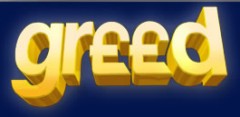
Contents |
Host
Co-hosts
Voiceover: Greg Burns
Broadcast
Grundy for Channel 5, 18 May to 9 June 2001 (11 episodes)
Synopsis
The new £1 million quiz show on the block is called Greed, or Gr££d as Channel 5's titles insist on putting it, or Gr€€d as it was in the original trailers - proving that Channel 5 is against the Euro. Odd, given they're partly-owned by RTL.
This was originally broadcast in America as Fox's answer (or should we say "knee-jerk reaction") to Millionaire back when you couldn't move for Millionaire wannabes. That version gave away $2million. This one is going to try and give away £1million, which is still more once you've taken taxes and currency conversion into account. Hurrah!
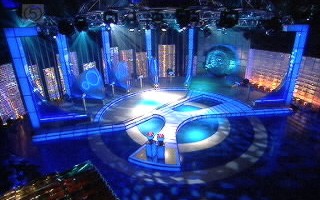 The set of Greed, seemingly modelled on the shape of a G-string
The set of Greed, seemingly modelled on the shape of a G-stringAfter the titles of a camera flying through various stages of a bank vault, we see the first impressions of an impressive set: it seems like a high-rise skyscraper with barred windows with other skyscrapers in the background. But on secondary examination those skyscrapers are actually bars of gold, aren't they? Oh. Yes, the bank vault theme is continued. Excellently, the new teams come out through a giant opening safe door: niiice. Also nice is the podia the contestants stand behind for the elimination. It comes up when the contestants come on, and it goes down drawbridge style after the elimination. Again - niiice.
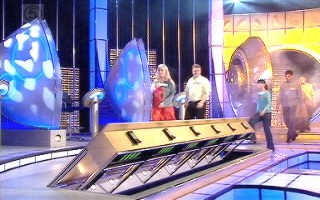 Dig that motorised desk
Dig that motorised deskThese two features almost make up for the general blandness for the rest of the set. Seats and monitors for each of the contestants, each of which is partitioned off so the contestants can't see each other (apart from the captain's seat who can see all of them), on one side of the studio is the 'Terminator Zone' and the host's computer is next to the captain's.
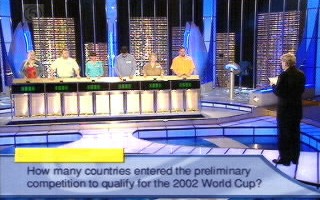 The guesstimation question in progress
The guesstimation question in progressWhen each team comes on, they've got to play an elimination game. Amusingly, but not good amusingly, after the announcer gives the name the contestant has to give their occupation and location. Six people is one person too much, so after introducing the team they're asked a guesstimation question. After each person has punched in their answers, we see who makes the team in order from nearest answer (who becomes team leader) to second through fifth, who come second through fifth in command respectively. The sixth and last person has to go home but rather cryptically "is returned to the contestant pool so might come back on a later show".
The Tower of Greed has eight different stages and it's rather a top-heavy tower given that the big money is at the top and the small money is at the bottom. Scientifically, all it would take is a bit of pressure anywhere to topple that tower and cause a huge mess. It begins at £5,000, then £10,000, £25K, £50K - then in the Premier Division - £100K, £250K, £500K and finally £1 million.
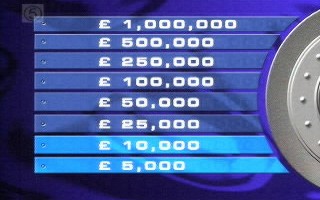 The Tower of Greed, just next to Wandsworth Common
The Tower of Greed, just next to Wandsworth CommonThe most important contestant is the Leader. The Leader's decision is final. It is up to the Leader to accept the answer their team mate has given or to change the answer given. It is also the Leader's sole decision to move up to the next level or not - and they must do this without knowing the question in advance. However, because the leader can see the team, they can nod or shake their heads to show how they feel. They mustn't say anything unless asked to.
OK, Questions 1-4 are fairly simple enough, and they're asked in reverse order of how they did in the Elimination, so the easiest £5K question goes to the person fifth in command, whilst the £50K question goes to the person who was second best. Each question at this point has one correct answer out of a possible four (for questions 1 and 2) or five (for questions 3 and 4). The team member must give an answer, and they can say how confident they are but they can't say why they think it is what it is.
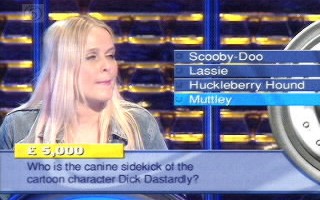 £5000 in the bank. Banzai!
£5000 in the bank. Banzai!The leader must then decide. If the leader is wrong then nobody will talk to them ever again because they've lost everything. Ahhhhhhh. If they are correct then that's lovely, they split the money between them so the first question is worth £1,000 to each person and the fourth question is worth £10,000 to each person. The Leader is asked after each question whether they want to go on or not. Once the Leader has given their final answer, a surprising amount of tension is generated between host saying "Is ??? correct?" and the computer displaying a tick or a cross. A lot less irritating then Is That Your Final Bloody Answer anyway.
The split screen effect of giving the four team members a quarter each and the leader a giant diamond in the middle doesn't work particularly well, looking as it does a bit cluttered as if a Spanish person is directing the show. In fact at this point, why don't we just concentrate for a bit on the graphics shall we? Yes. In a word: adequate. Nothing whizzy (other than the turning safe lock where the answers are given), the questions are answers given in a modern and slightly boring font. The colours (blue, white and yellow) are too low-contrast and difficult to read. All in all, it's lacking a bit in excitement and imagination.
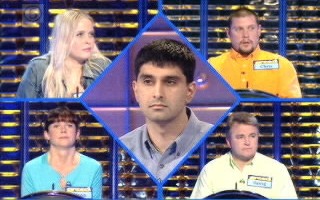 I'm sure I've seen some postcards done like this
I'm sure I've seen some postcards done like thisThis is compounded by the music. As you well know by now, we are big fans of the atmospheric futurogoth genre. Whilst this one has music, notably a stringy version of the OK theme during the contestant anecdotes (and therefore repeated far too much), the question music is understated in such a way that we don't remember it.
OK, so far, so Millionaire. It's after four questions that things get more interesting and Greed takes a turn for the nasty. The rules change. For the remaining questions, each one has four correct answers out of six, seven, eight or nine possible choices. Each team member is asked to give one answer in the same order as before. Again, the leader has final decision over the final four options chosen.
To make things even easier, and to make going for big money a more attractive proposition, the team is told the category of the question and they are given one "freebie" (spelt "fr££bi£") which they can use once and once only which will remove a wrong answer. Once all four answers have been selected and three have been determined to be correct, the Leader is offered a buy-out, a guaranteed lesser prize to pull out of the question before the fourth answer is judged. We think the judgement is given away a bit too easily though, they seem to read off correct answers from the top of the list so when the first one gets skipped over you have to ask yourself why...
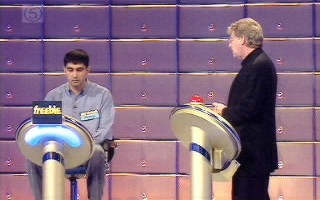 Jerry offers the leader a freebie. In public as well. Tsk!
Jerry offers the leader a freebie. In public as well. Tsk!If they decide to go for a big question then another feature comes into play. The Terminator (gasp!). Jerry pushes the giant red button, we go back to our split screen screen to see there are spotlights in the studio flashing on and off each contestant, stopping on a random one (a bit old hat, really). That person is put in a dilemma. They can keep the team as it is and go on OR! they can challenge someone else for their share of the cash. To make the Terminator a little more attractive, that contestant is offered a guaranteed payment of £5000.
The Terminator Showdown takes place down one end of the studio and consists of a one question sudden death contest. Win and you can shout "I'll be back" in a dodgy Austrian accent and you win your seat in the game, your score now showing 2 x an individual share + £5000. If the Leader is challenged and the Leader loses, the Terminator winner becomes the Leader. It's an interesting addition, but one in which the set designers didn't bother trying too hard with. "'Ere, Bob, what did we do with the buzzers from Family Fortunes? We'll jazz them up a bit and randomly stick them somewhere in the studio. Bosh!"
 The set of Greed, with the terminator buttons in the foreground
The set of Greed, with the terminator buttons in the foregroundThat's the game then. It sounds a bit complicated doesn't it? Well to be fair, it's not so much complicated as complex. In theory, it should be more interesting than Millionaire. Due to certain production things however it doesn't quite work as well. Certainly, it sounds a lot more difficult to understand when it's explained than it is to actually do/watch. Because the Leader has many responsibilities, having all these responsibilities spelt out to you tends to slow the game down. Other things that slow the game down come from the hilarious and crazy anecdotes the contestants are asked about before they get given question. Hilariously, it's quite possible to win a good coupla' thousand quids without getting talked to, perhaps the easiest money you'll ever make.
The other thing is that you're asking people to gamble tens and hundreds of thousands of pounds without knowing the question in advance (although they do get to hear the subject matter for questions 5-8). Give people the choice between a certain £10K or a possible £20K or nothing then most Brits are going to play conservatively. This is quite important really because it's only when they get to the top half of the tower that the show gets really interesting, but everyone seems to want to stop at a shared £50K. They need contestants with more guts!
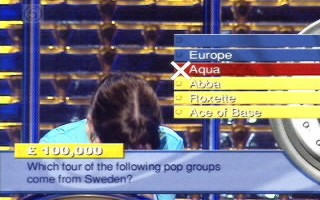 The fact that Aqua's from Denmark has cost them £50,000
The fact that Aqua's from Denmark has cost them £50,000We'd also argue that some of the questions - while generally of a very good research standard indeed - are a bit on the hard side. If it gets a lot more exciting after question 4, having a very difficult or obscure £50K question is going to put them off and as such becomes no better than Millionaire, which people are getting bored of because no-one wants to gamble.
It's probably about time we mentioned the host. Fed up by cries of "Go Jerry! Go Jerry!" from the world-famous Jerry Springer Show. he finally went and came over to Britain. After doing This Morning for a week and having his own late night chat show on ITV and then Channel 5, Channel 5 wanted him to host this. And here's the perhaps surprising thing, he's really not that bad. Good in fact! Not nauseatingly lovely like many American gameshow hosts but talkative, authoritative and friendly. This is mainly thanks in part because he has no problem talking to and dealing with contestants and mocking them after their anecdotes, experience of which he's got with his political and talk-show background.
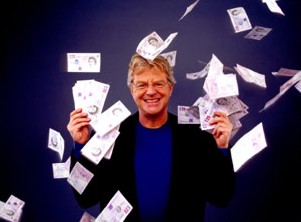 Jerry feels the need for Greed
Jerry feels the need for GreedGood at ad-libbing comments and injecting varying amounts of excitement at varying moments, his main failing is that he doesn't seem too comfortable describing all the rules to the contestants in one go, as if he's read the rules script, tried to remember it word for word, thought about it too much and wants to get all the points out as fast as he can so all bases get covered, if you see what I mean. He even apologises when he thinks his accent affects the answers, bless his cotton socks. He does have a rather irritating habit of flipping his glasses up and down a bit too much though. Also, it might have been nice if he played up the temptation aspect a bit, perhaps more teams would be happier to go that way.
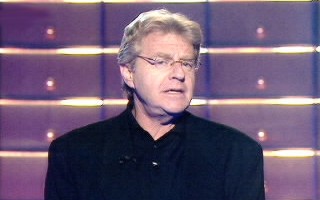 "Take care of yourself, and each other"
"Take care of yourself, and each other"Given that another of Channel 5's owners is Pearson and this is a Pearson-handled format, we suppose this was a no-brainer to commission and, you know, if it offers something a bit different then why not? It's just a shame that it won't get millions in ratings because of the Big Brother/Survivor clash coming up this Summer.
So how do we end this review then? Do we be obvious and rubbish by saying the immortal Wall Street line "Greed is Good?" do we give a total thumbs up by saying "Yes, we feel the need for Greed?" or do we be honest and say "Greed is an OK offering from Channel 5 that is good in idea and concept but is merely OK in practice. Certainly it's not the next Millionaire but potentially it is more interesting. Potentially."
Catchphrases
"Do you feel the need for Greed?"
Inventor
Based on the original Fox (US) show by Dick Clark Productions
Theme music
Graham Ness
Web links
Future Chaser Shaun Wallace leading a team

